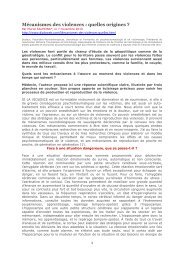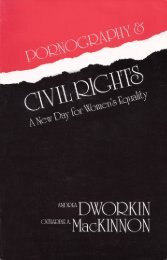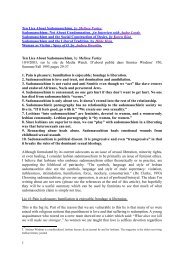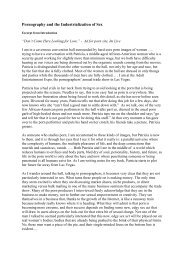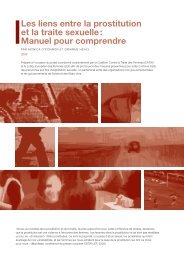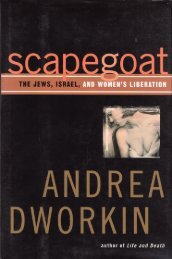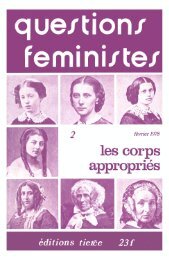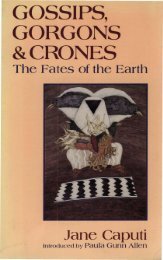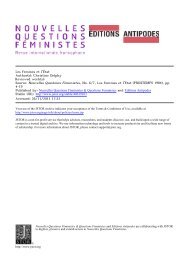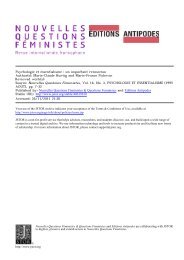xxiiAccording to Kristeva, “women exist” is an essentialist statement, but nothing is,negation is, and is a higher form <strong>of</strong> being than woman. 8 More mundanely, this is theideological practice <strong>of</strong> the organization <strong>of</strong> consent and deconstruction <strong>of</strong> dissent,necessary for pr<strong>of</strong>essional practice. For Kristeva, woman is an attitude, not a sexualor political subject. As Ann Rosalind Jones (1981, p. 249) remarks, “‘woman’ toKristeva represents not so much a sex as an attitude, any resistance to conventionalculture and language; men, too, have access to the jouissance that opposesphallogocentrism.” Woman represents the semiotic—an oceanic bliss/swamp <strong>of</strong> themother-child dyad, a communication <strong>of</strong> rhythm, preverbal sound. “She” is anattitude best held by men: for Kristeva, it is in the work <strong>of</strong> male authors Joyce,Artaud, Mallarmé, etc. that this semiotic state <strong>of</strong> union with the maternal is bestelaborated. This, I suspect, is why Kristeva forbids women to mention the game, tomove to subjectivity: it would block men’s access to the primal maternal source <strong>of</strong>their verbal creativity, it would pr<strong>of</strong>ane men’s ancestral memories <strong>of</strong> Mother. Ifwomen claim and proclaim this matrix, it would be horrid. Then there would be realchaos. So women must be still and think <strong>of</strong> the linguistic empire. In Kristeva’s view,“woman” or “women” by women is a bad attitude.Let’s be realistic, say some women. Do you really think that you can start fromscratch and just leave theory out entirely, just because it’s male? Don’t you see thatyou can pick and choose from it all in order to make feminist theory? Or, asElizabeth Grosz 9 puts it in introducing feminists to Jacques Lacan, “feminists maybe able to subvert and/or harness strategically what is useful without beingcommitted to its more problematic ontological, political and moral commitments”(1990, p. 7). This is based on her und<strong>ers</strong>tanding <strong>of</strong> psychoanalysis as “a method <strong>of</strong>reading and interpreting (where questions <strong>of</strong> truth, bias and verification are notrelevant)” (1990, p. 21). That rational—or irrational—science is pure methodologyis an old ideology which feminist critiques <strong>of</strong> science have exposed (Keller: 1985;Harding, et. al: 1983; Lloyd: 1984). These recent feminist analyses <strong>of</strong> masculinerationality show how subjective it is, how it masks and develops masculinedomination. Such epistemological critiques warn against a dangerous and superficialneutrality.The objection to “starting from scratch” denies women’s social and politicalthought and its suppression. First <strong>of</strong> all, women, who try to use unprocessedingredients in their recipes in order to avoid preserving masculine categories and8. For an examination <strong>of</strong> critical approaches to Kristeva’s work, see Eleanor Kuykendall (1989) whoillustrates how Kristeva endorses Freudian paradigms and “leaves no place for a feminineconception <strong>of</strong> agency” (1989, p. 181). Gayatri Spivak is quite clear: “I’m repelled by Kristeva’spolitics: what seems to me to be her reliance on the sort <strong>of</strong> banal historical narrative to produce‘women’s time’: what seems to me Christianizing psychoanalysis; what seems to me to be her sort <strong>of</strong>ferocious western Europeanism: and what seems to me to be her long-standing implicit sort <strong>of</strong>positivism: naturalizing <strong>of</strong> the chora, naturalizing <strong>of</strong> the pre-semiotic, etcetera” (1989, p. 145).9. Grosz displays more inadvertent masculine supremacy with the statement: “Given the mother’s(up to now) indispensable role in bearing children…” (1990, p. 146). Artificial wombs and placentasare still a fantasy. Even if Grosz is referring to “contract moth<strong>ers</strong>”, this negation <strong>of</strong> them as moth<strong>ers</strong>participates in the patriarchal ideology which privileges genetic genealogy over birth (Brodribb:1989a).
xxiiiimplications, are punished. As anyone who has ever done it knows, confrontingpatriarchy or critiquing “male-stream” (O’Brien: 1981, p. 5) knowledge is not“easy”: it involves risk and there are consequences. There is so little support forradically feminist work; its costs are exorbitant politically, p<strong>ers</strong>onally, economically,intimately, as Dale Spender’s Women <strong>of</strong> Ideas and What Men Have Done to Them(1983) attests. All feminist work faces a reality <strong>of</strong> exceptional hostility masked by aself-satisfied ideology <strong>of</strong> acceptance by sexist institutions, some <strong>of</strong> which currentlyconsume Women’s Studies like a prestige item. Radical work is perceived asdangerous, and discomfits those who have made more stable arrangements withinpatriarchal systems. Rather than forbidding originality then, let us remember thescratching out <strong>of</strong> women’s writing as a historical and political process. Our derisionshould be directed towards male-stream thought and the processes which exclude,distort and suppress women’s writing and history. As Virginia Woolf demonstrates,we must continually interrogate this “civilization” and ask: “[w]here in short is itleading us, the procession <strong>of</strong> the sons <strong>of</strong> educated men?” (1947, p. 115).As for the idea that feminists should be ragpick<strong>ers</strong> in the bins <strong>of</strong> male ideas, weare not as naked as that. The notion that we need to salvage for this junk suggeststhat it is not immediately available everywhere at all times. The very up-to-dateproducts <strong>of</strong> male culture are abundant and cheap; it is one <strong>of</strong> life’s truly affordablethings. In fact, we can’t pay not to get it, it’s so free. So what we have is a difficultyin refusing, <strong>of</strong> not choosing masculine theoretical products.The second difficulty here is the relationship <strong>of</strong> theory to action implicit in thenotion that feminist theory must be an arrangement <strong>of</strong> and selection from maletheory, not a knowledge that consid<strong>ers</strong> female experiences. Underneath this notionlies the historically specific dualism <strong>of</strong> intellect vs act, theory vs practice, amasculine methodology and ideology which has trained and constrained us all. Evento the point where now some suggest (Weedon: 1987; Nicholson: 1990; Hekman:1990) that male theory should be the vanguard for feminist practice, again reflectinga sense <strong>of</strong> inferiority and belief that all feminist thought will be and should bederivative <strong>of</strong> masculine texts not women’s practice. Also, this approach does notrecognize other feminists and other feminisms as alternatives to the male text. Arenot the works <strong>of</strong> women and feminists: Black, lesbian, Jewish, working-class, ThirdWorld, Native—a more significant source for und<strong>ers</strong>tanding difference andotherness than the writings <strong>of</strong> white, western men?Barbara Christian’s excellent article points to how womanist prose is beingneglected. This new white western male 10 theory is a language that “mystifiesrather than clarifies” the condition <strong>of</strong> Blacks and women (1988, p. 17). Related tothe theory/action obfuscations <strong>of</strong> postmodernism, is the question <strong>of</strong> experience andwhat Hartsock (1983) and oth<strong>ers</strong> have called a “standpoint”. Responding to the10. See hooks (1990, 1991a) for a critical consideration <strong>of</strong> differences on race, sex and difference.Barry (1990, p. 100) criticizes the racism <strong>of</strong> some feminist postmodernism. Contrary to its claimedsuperiority on this issue, Feminism/<strong>Postmodernism</strong>, for example, contains no substantial engagementwith the issue as Modleski points out (1991, p. 18). In her forthcoming Chapter 9, “PostmodernReductionisms: Div<strong>ers</strong>ity v<strong>ers</strong>us Specificity,” Angela Miles argues that the “integrative politics <strong>of</strong>cont. next page
- Page 3: Somer Brodribb teaches feminist the
- Page 6: Spinifex Press Pty Ltd,504 Queensbe
- Page 10 and 11: viiiAnd you get into trouble when y
- Page 12 and 13: xIt is possible to avoid the fate o
- Page 15: Paris, July 14, 1985Dear Mary,Just
- Page 18 and 19: xviH.D. tried to turn the Lord Freu
- Page 20 and 21: xviiiwith and parade a hysterical f
- Page 22 and 23: xxsexual, emotional, political desi
- Page 26 and 27: xxivcharges that political feminism
- Page 28 and 29: xxvisimplistic, words like oppressi
- Page 30 and 31: xxviiiorthodox. In particular, she
- Page 32 and 33: xxxIn the men’s room(s)When I was
- Page 34 and 35: 2 NOTHING MAT(T)ERSthe post-1945, p
- Page 36 and 37: 4 NOTHING MAT(T)ERSWe cannot afford
- Page 38 and 39: 6 NOTHING MAT(T)ERSStructuralism 5
- Page 40 and 41: 8 NOTHING MAT(T)ERSThere is no clea
- Page 42 and 43: 10 NOTHING MAT(T)ERS“Postmodernis
- Page 44 and 45: 12 NOTHING MAT(T)ERSIn The Postmode
- Page 46 and 47: 14 NOTHING MAT(T)ERSdoubt that we r
- Page 48 and 49: 16 NOTHING MAT(T)ERSmurder which in
- Page 50 and 51: 18 NOTHING MAT(T)ERSmisogyny become
- Page 52 and 53: 20 NOTHING MAT(T)ERS“end of meani
- Page 55 and 56: 2NOTHINGNESS AND DE/GENERATIONSeyto
- Page 57 and 58: NOTHINGNESS AND DE/GENERATION 25is
- Page 59 and 60: NOTHINGNESS AND DE/GENERATION 27tra
- Page 61 and 62: NOTHINGNESS AND DE/GENERATION 29mis
- Page 63 and 64: NOTHINGNESS AND DE/GENERATION 31str
- Page 65 and 66: NOTHINGNESS AND DE/GENERATION 33Bei
- Page 67 and 68: NOTHINGNESS AND DE/GENERATION 35In
- Page 69 and 70: NOTHINGNESS AND DE/GENERATION 37rec
- Page 71 and 72: 3EXISTENCE AND DEATHThe madman jump
- Page 73 and 74: EXISTENCE AND DEATH 41“Man is per
- Page 75 and 76:
EXISTENCE AND DEATH 43History has n
- Page 77 and 78:
EXISTENCE AND DEATH 45unconscious,
- Page 79 and 80:
EXISTENCE AND DEATH 47[M]y main con
- Page 81 and 82:
EXISTENCE AND DEATH 49Do the workin
- Page 83 and 84:
EXISTENCE AND DEATH 51repudiated hi
- Page 85 and 86:
EXISTENCE AND DEATH 53Discourse was
- Page 87 and 88:
EXISTENCE AND DEATH 55way for when,
- Page 89 and 90:
EXISTENCE AND DEATH 57p. 278). Life
- Page 91 and 92:
EXISTENCE AND DEATH 59‘bodies and
- Page 93 and 94:
EXISTENCE AND DEATH 61de Sade. I ar
- Page 95 and 96:
EXISTENCE AND DEATH 63an eternal re
- Page 97 and 98:
EXISTENCE AND DEATH 65with bravado
- Page 99 and 100:
EXISTENCE AND DEATH 67accompanies h
- Page 101 and 102:
EXISTENCE AND DEATH 69seek access t
- Page 103 and 104:
4NEUTRALITY AND DE/MEANINGAccording
- Page 105 and 106:
NEUTRALITY AND DE/MEANING 73of the
- Page 107 and 108:
NEUTRALITY AND DE/MEANING 75Derrida
- Page 109 and 110:
NEUTRALITY AND DE/MEANING 77Animali
- Page 111 and 112:
NEUTRALITY AND DE/MEANING 79belongs
- Page 113 and 114:
NEUTRALITY AND DE/MEANING 81origin
- Page 115 and 116:
NEUTRALITY AND DE/MEANING 83women,
- Page 117 and 118:
NEUTRALITY AND DE/MEANING 85The ess
- Page 119 and 120:
NEUTRALITY AND DE/MEANING 87laughte
- Page 121 and 122:
5LACAN AND IRIGARAY: ETHICALLACK AN
- Page 123 and 124:
LACAN AND IRIGARAY: ETHICAL LACK AN
- Page 125 and 126:
LACAN AND IRIGARAY: ETHICAL LACK AN
- Page 127 and 128:
LACAN AND IRIGARAY: ETHICAL LACK AN
- Page 129 and 130:
LACAN AND IRIGARAY: ETHICAL LACK AN
- Page 131 and 132:
LACAN AND IRIGARAY: ETHICAL LACK AN
- Page 133 and 134:
LACAN AND IRIGARAY: ETHICAL LACK AN
- Page 135 and 136:
LACAN AND IRIGARAY: ETHICAL LACK AN
- Page 137 and 138:
LACAN AND IRIGARAY: ETHICAL LACK AN
- Page 139 and 140:
LACAN AND IRIGARAY: ETHICAL LACK AN
- Page 141 and 142:
LACAN AND IRIGARAY: ETHICAL LACK AN
- Page 143 and 144:
LACAN AND IRIGARAY: ETHICAL LACK AN
- Page 145 and 146:
LACAN AND IRIGARAY: ETHICAL LACK AN
- Page 147 and 148:
LACAN AND IRIGARAY: ETHICAL LACK AN
- Page 149 and 150:
LACAN AND IRIGARAY: ETHICAL LACK AN
- Page 151 and 152:
6OUT OF OBLIVIONPhilosophy, both id
- Page 153 and 154:
OUT OF OBLIVION 121whose call to th
- Page 155 and 156:
OUT OF OBLIVION 123Figure 1: Egypti
- Page 157 and 158:
OUT OF OBLIVION 125Figure 3: Materi
- Page 159 and 160:
OUT OF OBLIVION 127life and death,
- Page 161 and 162:
OUT OF OBLIVION 129unsettle and soo
- Page 163 and 164:
OUT OF OBLIVION 131Lacan has gone b
- Page 165 and 166:
OUT OF OBLIVION 133(1989, p. 27-28)
- Page 167 and 168:
OUT OF OBLIVION 135in the social re
- Page 169 and 170:
OUT OF OBLIVION 137that anyone can
- Page 171 and 172:
OUT OF OBLIVION 139Figure 5: Kylix
- Page 173 and 174:
OUT OF OBLIVION 141lover, Ariadne,
- Page 175 and 176:
OUT OF OBLIVION 143neutralized and
- Page 177 and 178:
OUT OF OBLIVION 145But Deconstructo
- Page 179:
OUT OF OBLIVION 147recurrent Same.
- Page 182 and 183:
150 NOTHING MAT(T)ERSBarry, Kathlee
- Page 184 and 185:
152 NOTHING MAT(T)ERSCanguilhem, Ge
- Page 186 and 187:
154 NOTHING MAT(T)ERSDerrida, Jacqu
- Page 188 and 189:
156 NOTHING MAT(T)ERSEagleton, Terr
- Page 190 and 191:
158 NOTHING MAT(T)ERSFreud, Sigmund
- Page 192 and 193:
160 NOTHING MAT(T)ERShooks, bell. (
- Page 194 and 195:
162 NOTHING MAT(T)ERSJones, Ann Ros
- Page 196 and 197:
164 NOTHING MAT(T)ERSReality: Femin
- Page 198 and 199:
166 NOTHING MAT(T)ERSMegill, Allan.
- Page 200 and 201:
168 NOTHING MAT(T)ERSPatai, Daphne.
- Page 202 and 203:
170 NOTHING MAT(T)ERSSade, Donatien
- Page 204 and 205:
172 NOTHING MAT(T)ERSThompson, Deni
- Page 206 and 207:
174 NOTHING MAT(T)ERSby Carolyn Bur
- Page 208 and 209:
176 NOTHING MAT(T)ERSDionysus (Bacc
- Page 210:
178 NOTHING MAT(T)ERSPoovey, Mary,



